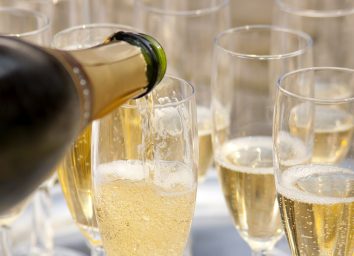What Happens to Your Body When You Drink Champagne
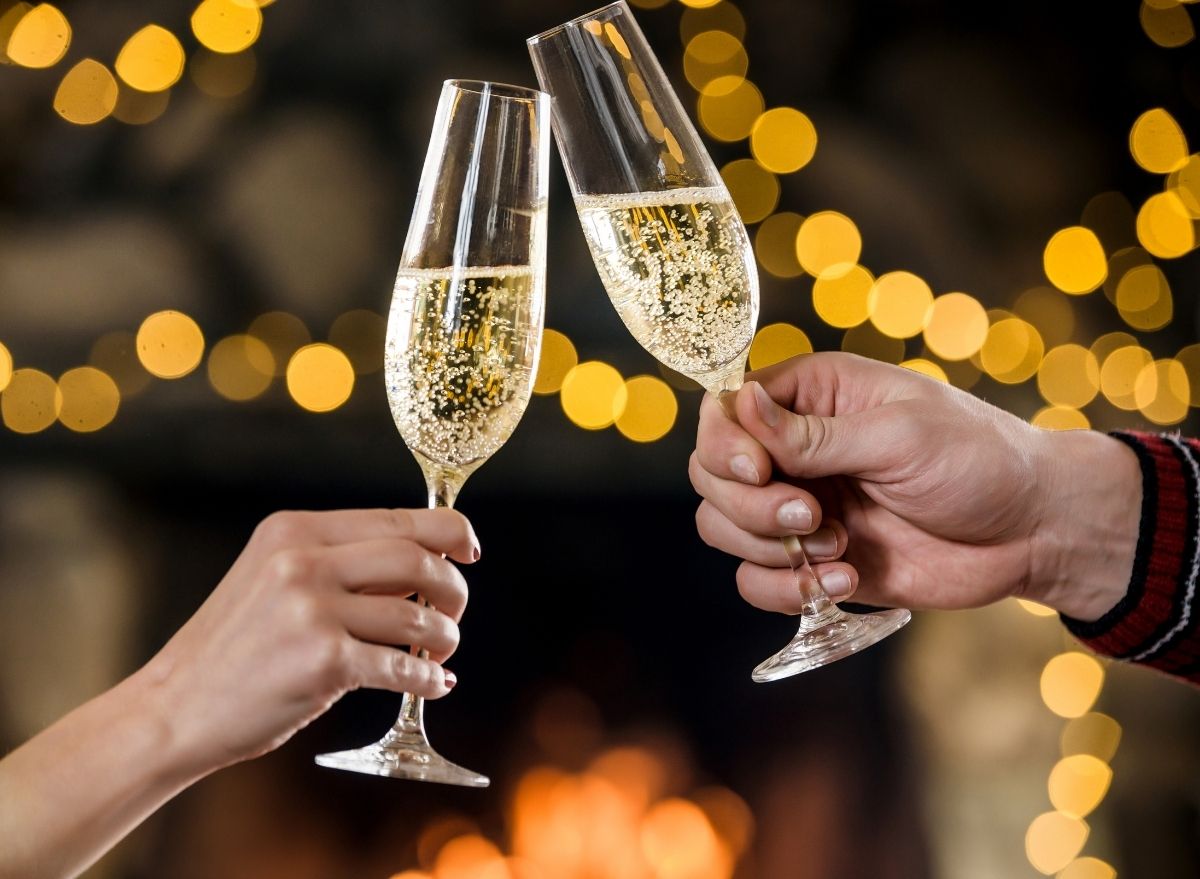
Whether you're toasting to a new year, a new job, an anniversary, or an engagement, bubbly is without a doubt the most popular drink of choice for celebratory occasions. But what happens to your body when you drink champagne? While it causes many of the same consequences as white wine, champagne also has a few unique effects that experts want you to know about.
"If you are going to be consuming alcohol, champagne may be a healthier choice compared to other drinks that are much higher in calories and alcohol content," says Brad Dieter, NASM-certified nutrition coach, co-author, and research scientist. "But if you are trying to reduce the amount of calorie-containing beverages in your diet for weight loss, champagne may not be a healthy beverage choice."
The bottom line? Champagne is pretty healthy as far as adult beverages go—but it's important to keep in mind that it's still alcohol. Still, if Queen Elizabeth ends every day with a glass of bubbly, and she's lived to 94 years old (and counting), how bad can it be?
Before you pop that cork—here are a few things to know. And for more, check out The Most Popular Wine in Every State
You'll support your memory.

"Like most things in life, drinking champagne comes with both the good and the bad," says John Fawkes, an NSCA-certified personal trainer and Precision Nutrition-certified nutritional counselor, and managing editor of The Unwinder. "The good is that the standard NYE cocktail is rich in phenolic acid, which has been linked to longevity and improved recall."
In fact, 2013 research conducted at the University of Reading in the U.K. found that phenolic acid in champagne positively affected spatial memory in lab rodents. Spatial memory helps you to remember where different objects are in relation to others (like when you're trying to navigate a new city). Champagne supplementation was also found to increase labels of a protein called dystrophin (which, when lacking, is linked to impaired cognitive function) and an enzyme in the central nervous system called CNPase (which, when reduced, is associated with Alzheimer's disease).
In short: drinking bubbly—in moderation, of course—may very well be good for your brain.
When you're looking for an affordable glass, check out our list of The Best Champagnes for Under $20.
You'll feel tipsy—fast.
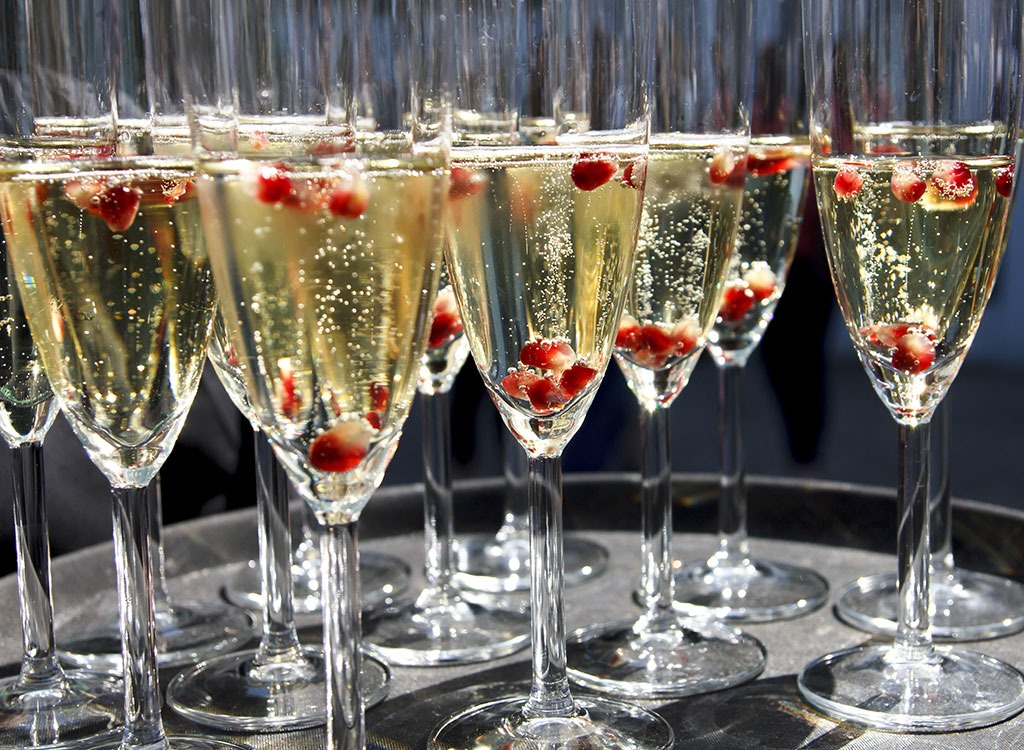
Ever noticed how you feel an instant buzz after just one glass of bubbly? You're not imagining things—there's a reason why people say champagne goes "straight to your head."
In fact, a study conducted at the University of Surrey in Guildford revealed that champagne does get you drunk faster than a standard white or red wine.
"Scientists speculate that the bubbles' carbon dioxide accelerates the flow of alcohol into the intestines," explains Fawkes.
By the way—clinical nutritionist Lovneet Batra adds that the carbon dioxide, which is a result of extra sugar and yeast added during the fermentation process—can also damage tooth enamel. So, be aware that guzzling champagne on the reg could compromise your dental health.
Related: This is the Fastest Way to Chill a Bottle of Champagne
Your metabolism shifts gears.
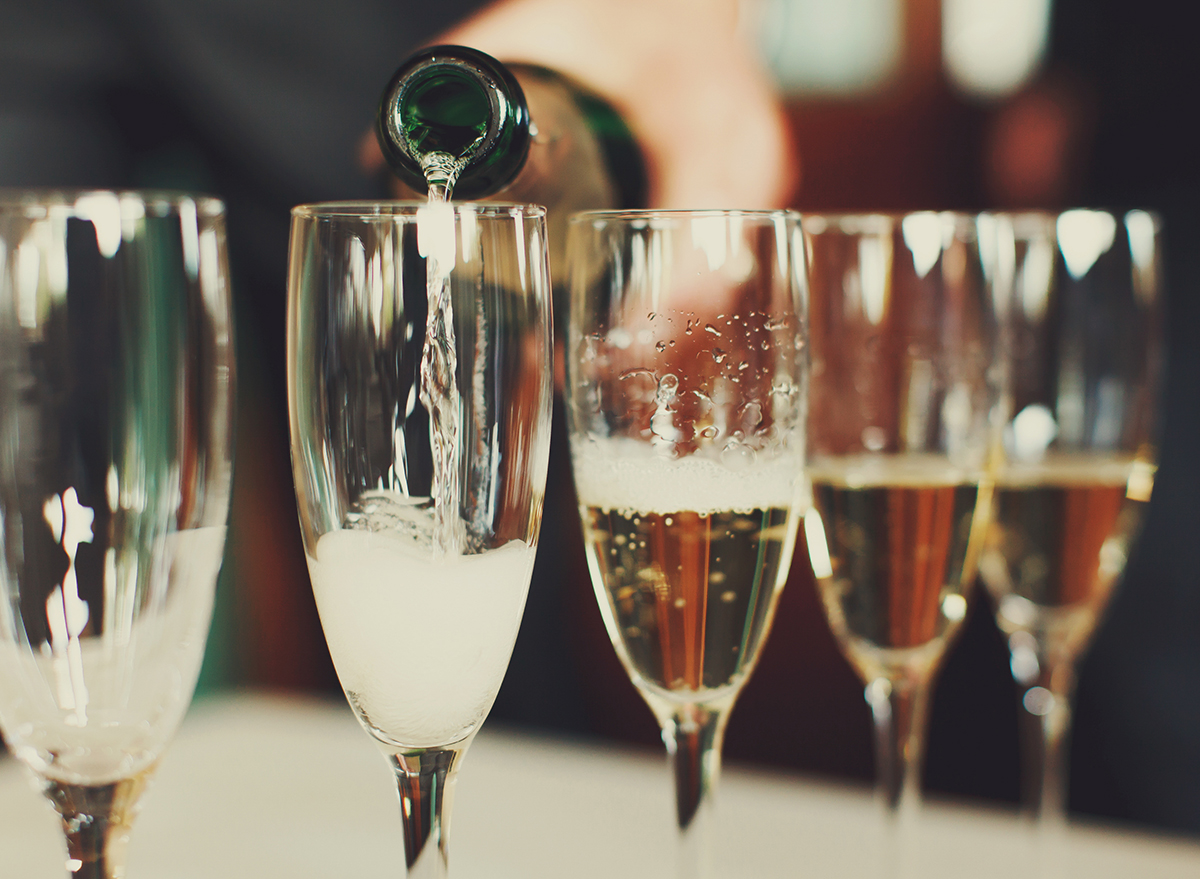
A glass of brut champagne contains about 80 to 90 calories—which may not seem like much, especially in comparison to the typical glass of white or red wine (which can contain up to 130 calories). But Elliot Reimers, a NASM-certified nutrition coach at RaveReviews, notes that those calories can definitely add up. Plus, knowing that champagne is a lower-calorie option may cause you to drink more of it.
"It's basically empty calories and can tempt you to eat more," he explains.
Not only that, but Vanessa Rissetto, a registered dietitian nutritionist and founder of Culina Health, explains that your body tends to start storing food as fat when it's forced to metabolize the sugars in the alcohol, turn it into ethanol and move it away from the bloodstream.
"Whenever you consume alcohol your metabolism shifts, with the degree to which it shifts depending on the amount of alcohol you consume," adds Dieter. "Your body does not have the ability to store alcohol to any meaningful degree, which means that when you consume alcohol you have to 'put the brakes' on metabolizing the other nutrients you normally metabolize for energy. This means that when you consume alcohol your body slows down the rate at which it utilizes carbohydrates and fat for energy and will start metabolizing alcohol."
Get even more healthy tips straight to your inbox by signing up for our newsletter.
You'll get a dose of antioxidants.

Just like its red and white counterparts, champagne is made from grapes—which means it also packs some antioxidants.
"These antioxidants help keep the blood vessels healthy, preventing blood clots and promoting better blood circulation," says Reimers. "They also reduce bad cholesterol."
However, it's worth noting that according to Rissetto, overconsuming alcohol in order to reap those benefits would cancel them out since alcohol can take quite a toll on your body.
That's why Batra highly recommends sticking to just one glass two to three times a week.
You'll probably become dehydrated.
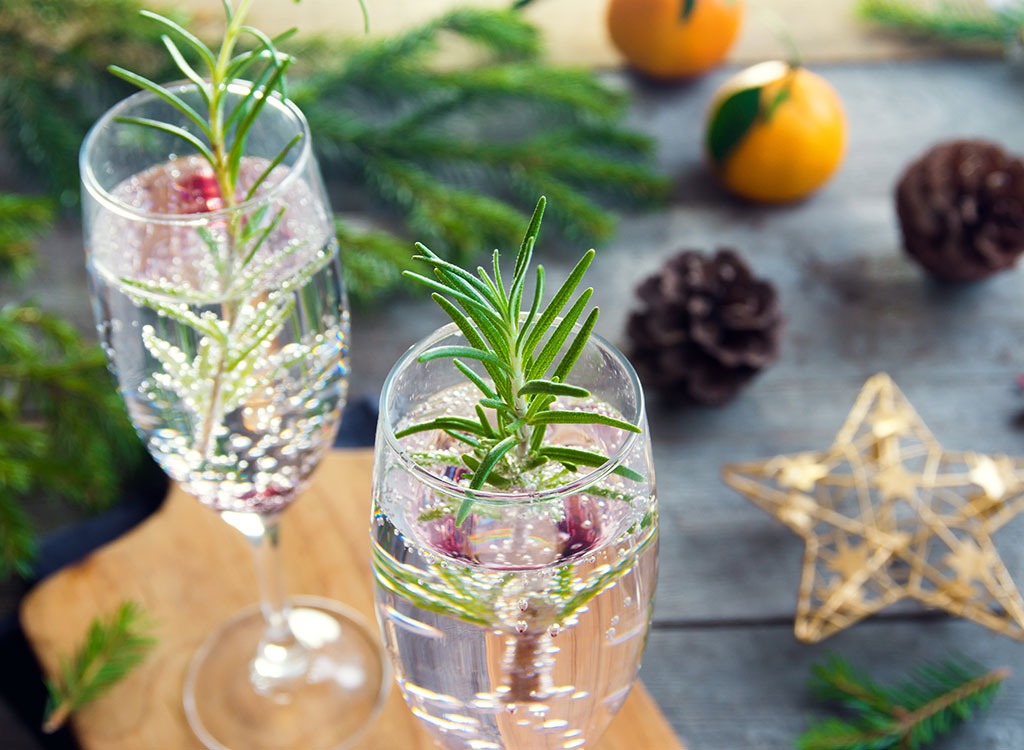
When drinking champagne, you'll definitely want to double-fist—with a glass of water, of course.
"Champagne, and alcohol of any nature, inhibits the antidiuretic hormone (ADH)," explains Lisa Richards, nutritionist and creator of The Candida Diet. "This hormone is necessary to prevent the body from ridding itself of all the water in the body through urine. The inhibitory effect that alcohol has on this hormone results in peeing more often and ultimately losing electrolytes. Just one alcoholic drink can cause urine production of up to a pint, which adds up quickly."
Dehydration can cause a slew of unpleasant effects, including dizziness, headaches, bloating, fatigue, and nausea. That's why it's so crucial to alternate every glass of bubbly with some good ol' H20.
Your mood may change.
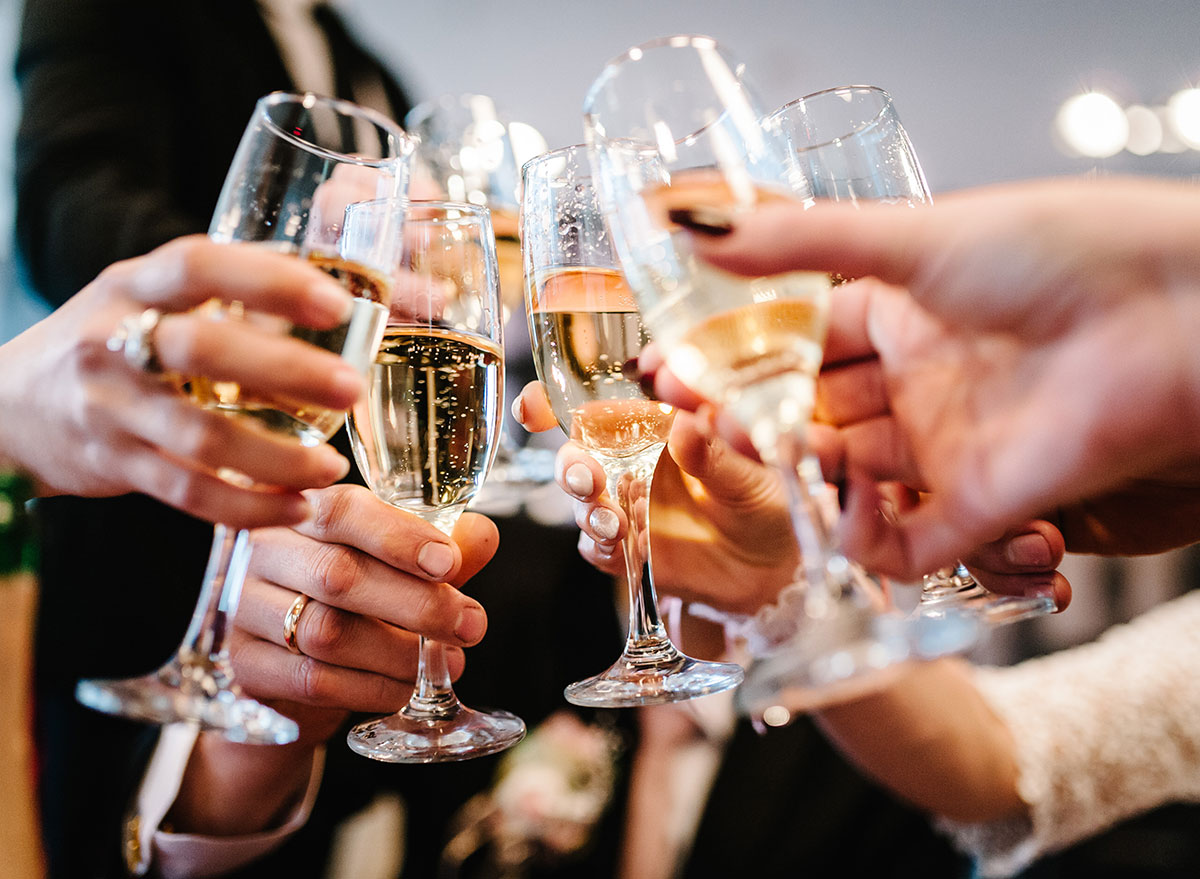
There's a good reason why people start to pop the champagne when they're in a celebratory mood—it can actually bring on those positive feels.
"Some research suggests that after drinking a glass or two of champagne, your mood changes to become less aggressive and more social," says Dieter. "But you may also become more anxious. There are large interindividual differences in how people experience alcohol, but there are pronounced, acute changes in mood."
According to Batra, one reason for these mood changes is the polyphenols, which have been proven to have antidepressant-like activity in the brain.
You might start feeling full.
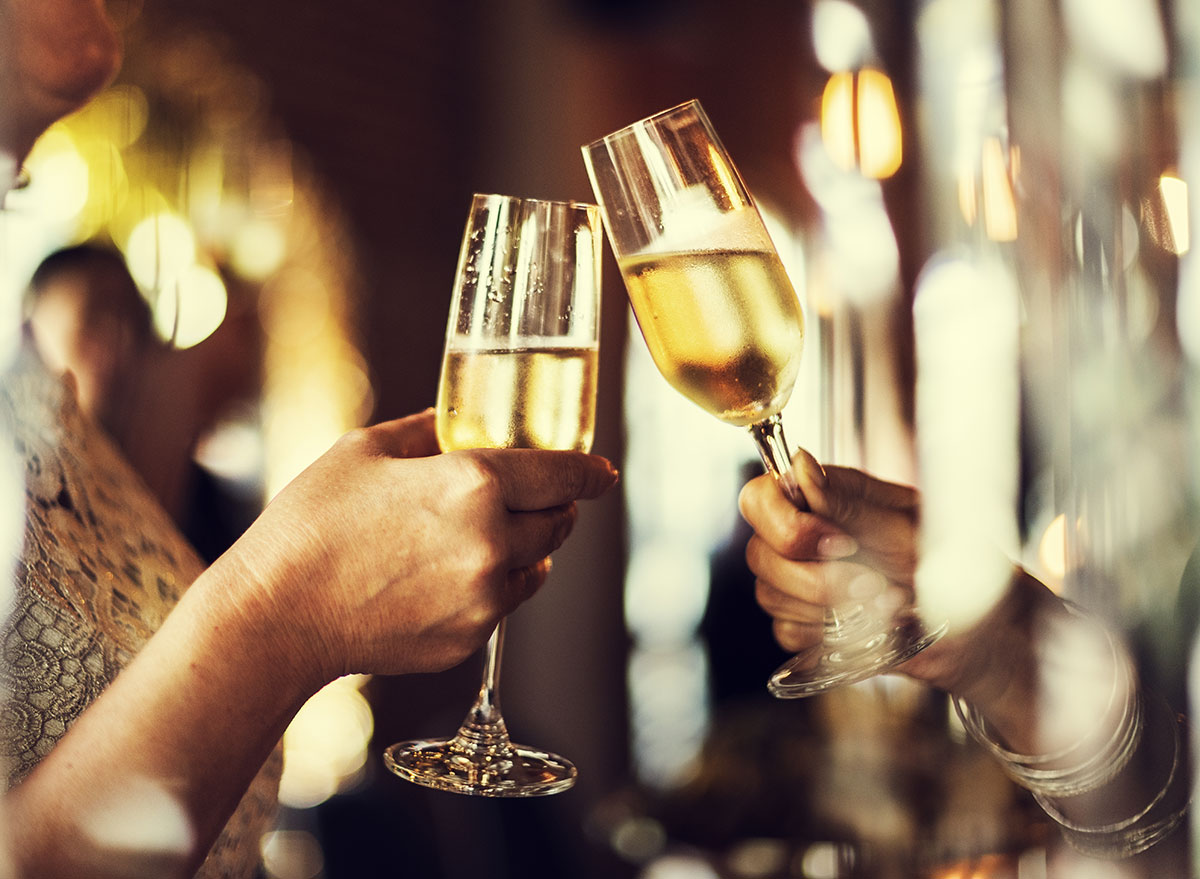
There's one more reason why champagne is a smart swap if you're trying to watch your weight.
"The carbonation in champagne can actually provide a little more satiety than other non-carbonated alcohol-containing beverages," explains Dieter. "Previous studies have shown that the more carbonation there is in a beverage, the more satiated people feel for a short period of time after consuming it with food."
In other words, if you opt for bubbly over other kinds of beverages (like cocktails or non-sparkling wine), you may be less likely to overeat. That said, it's important not to drink on an empty stomach, because food can help to slow down the rate at which your body absorbs the alcohol. So, may we suggest some charcuterie with that champagne?
Speaking of wine, here are Surprising Side Effects Wine Has On Your Immune System, Says Science.
